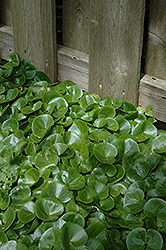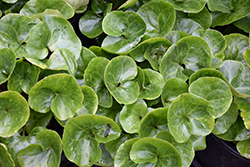Height: 8 inches
Spread: 18 inches
Sunlight:
![]()
![]()
Hardiness Zone: 4a
Other Names: Hexastylis europaea
Description:
This spreader features lovely glossy green leaves; does well in moist, shady areas, can be used as a shade groundcover, an excellent alternative to more invasive species
Ornamental Features
European Wild Ginger's attractive glossy heart-shaped leaves remain dark green in colour throughout the year on a plant with an upright spreading habit of growth.
Landscape Attributes
European Wild Ginger is an herbaceous evergreen perennial with an upright spreading habit of growth. Its medium texture blends into the garden, but can always be balanced by a couple of finer or coarser plants for an effective composition.
This is a relatively low maintenance plant, and is best cleaned up in early spring before it resumes active growth for the season. Deer don't particularly care for this plant and will usually leave it alone in favor of tastier treats. It has no significant negative characteristics.
European Wild Ginger is recommended for the following landscape applications;
- General Garden Use
- Groundcover
- Naturalizing And Woodland Gardens
Planting & Growing
European Wild Ginger will grow to be about 8 inches tall at maturity, with a spread of 18 inches. Its foliage tends to remain low and dense right to the ground. It grows at a medium rate, and under ideal conditions can be expected to live for approximately 10 years. As an evegreen perennial, this plant will typically keep its form and foliage year-round.
This plant does best in partial shade to shade. It does best in average to evenly moist conditions, but will not tolerate standing water. It is particular about its soil conditions, with a strong preference for rich, acidic soils. It is quite intolerant of urban pollution, therefore inner city or urban streetside plantings are best avoided, and will benefit from being planted in a relatively sheltered location. Consider applying a thick mulch around the root zone in both summer and winter to conserve soil moisture and protect it in exposed locations or colder microclimates. This species is not originally from North America, and parts of it are known to be toxic to humans and animals, so care should be exercised in planting it around children and pets. It can be propagated by division.
Disclaimer - This resource is provided for informational purposes only and does NOT reflect current availability. Inventory varies seasonally, so we cannot guarantee that every plant will be in stock at all times - please contact your favourite GardenWorks location directly for current availability. It does not include our entire inventory of plants, so be sure to visit GardenWorks to see varieties that may not be represented on this list.


